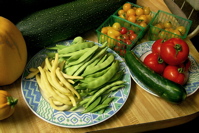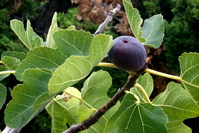Three Sisters by the Square Foot
In my old space in the Charles Street Gardens community garden in Sunnyvale, I grew corn, beans, and squash in the Native American "three sisters" style. Hills of corn are also planted with beans that vine up the corn stalks, and squashes ramble between the hills. I'm not positive my backyard here gets enough sun for corn, but I'm going to give it a try. I'm gardening by the square foot method, so I'll do three 2'x2' squares of corn. That should give me good pollination, on a per square basis, so that I can stagger the plantings to spread the harvest out over the summer. While I say "week" in my garden plan, I'll probably use 10 days as my spacing.
I'm planting "Painted Mountain", a corn developed from multiple Native American corn strains. It can be roasted or steamed fresh, though it is not as sweet as the modern supersweet corns. The real fun is that it can be dried to grind for flour. I have a KitchenAid grinder attachment that can handle corn and beans, and I hope to get enough corn to at least bake a batch of cornbread from the corn flour.
While the squashes I am planting in the three sisters garden are heirlooms, they are not Native American, rather they are compact Japanese squashes. To make up for that, I'm making sure to use heirloom Native American beans-- "Hidatsa Shield", "Repokob" (also known as Tiger Eye), and "True Red Cranberry". For the latter two, I'll be planting with seed saved from previous plantings of these beans, from my earlier three sisters garden. That feels like tradition!
My biggest worry is about the raccoons who visit our yard every year to feast on our fig trees. Raccoons and corn are not a good combination-- at least not for the gardener. When I grew "Mandan Red" corn in the community garden, I didn't have raccoon or squirrel problems, while folks growing sweet corn in nearby beds had issues. Here in my backyard where it will be the only corn to choose from, well, I just hope that it's not as appetizing as sweet corn. I've read that if you have a small corn harvest, you can wrap duct tape around each ear from the tip to the corn stalk. Raccoons pull down on the corn to break it off the stalk, and are allegedly not strong enough to break the stalk. We'll have to find out if it comes to that. I might try covering the corn with netting too, though that's got its own problems.








